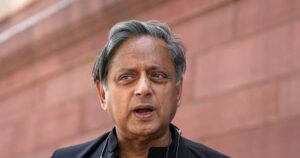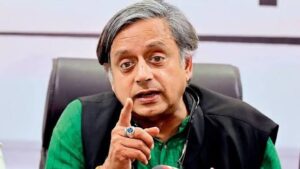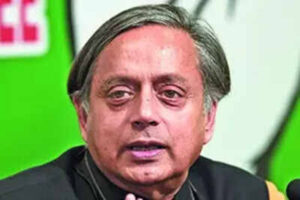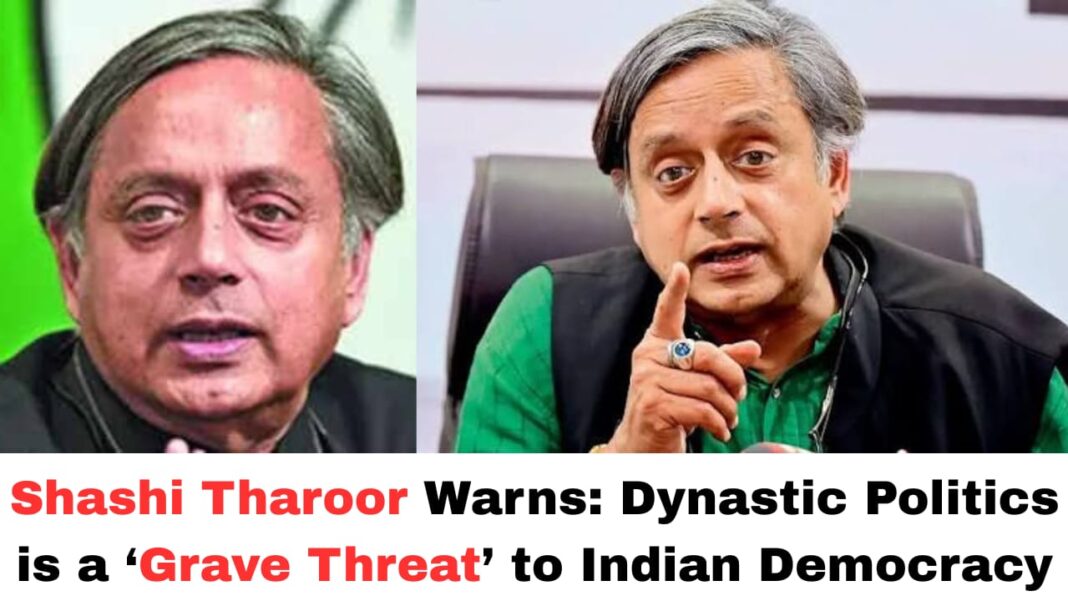Digital News Guru National Desk:
Why Shashi Tharoor Says Indian Politics Has Become a Family Business
Congress MP Shashi Tharoor has stirred a fresh controversy with his latest contribution: an article titled “Indian Politics Are a Family Business” published by Project Syndicate on 31 October 2025.
In that piece, Tharoor argues that dynastic politics — where political power is passed within families rather than earned on merit — presents a “grave threat” to India’s democratic promise. He writes:
“When political power is determined by lineage, rather than ability, commitment or grassroots engagement, the quality of governance suffers.”
He calls for a shift from dynasty to meritocracy, advocating reforms such as legally mandated term-limits, meaningful internal elections in parties, and a more empowered electorate.

Core arguments in the article
Tharoor’s critique can be summarised in four key points:
- Prevalence of family-rule in politics
While the article points to the famous example of the Jawaharlal Nehru-Indira Gandhi-Rajiv Gandhi-Rahul Gandhi-Priyanka Gandhi Vadra family, he insists that dynastic politics is not limited to one party. It spans regional and national parties alike — for example, the Bal Thackeray-Uddhav Thackeray-Aditya Thackeray in Maharashtra, the Mulayam Singh Yadav-Akhilesh Yadav succession in Uttar Pradesh, the K Chandrasekhara Rao family in Telangana, the M Karunanidhi-M K Stalin line in Tamil Nadu. - Governance and merit suffer
Tharoor contends that when the key qualification for political leadership becomes surname rather than roots, ability, or public service, the pool of talent shrinks.
“Drawing from a smaller talent pool is never advantageous.”
- Democratic promise at risk
Democracy is about government of the people, by the people, for the people. Tharoor argues that when politics becomes “a family enterprise”, the very ideal is compromised. - Reform suggestions
Tharoor doesn’t just criticise – he offers solutions:- Legal limits on how long one can hold party posts or seats.
- Internal democracy within political parties (elections, transparency) so that leadership isn’t inherited but earned.
- Voter education so that citizens evaluate leaders on performance, not pedigree.
Reaction and political ripple
The timing and nature of the article have triggered notable reactions.
- Bharatiya Janata Party (BJP) reaction: The BJP has seized the opportunity. It lauded Tharoor’s article as “very insightful”, using it to sharpen its critique of the Congress party’s dynastic legacy.
- Indian National Congress (INC) reaction: There is unease within Tharoor’s own party. Some senior leaders reportedly dismissed the article as Tharoor “seeking attention”. The official party line has been muted.
- Internal implications: The article places internal pressure on the Congress leadership. Tharoor is questioning the culture of leadership selection within his own party — an unusual move and potentially disruptive.

Why this matters
For Indian politics
- Wider issue than one party: By pointing to dynastic politics across parties, Tharoor highlights a systemic challenge — not just a problem of one family or one party.
- Merit vs pedigree debate: The article rekindles an older debate: should Indian politics offer a level playing field or favour lineage? In a democracy, the answer matters.
- Institutional reform spotlight: Calls for internal party reform and term-limits echo wider concerns about democratic renewal — relevance beyond just Congress.
For the public and democracy
- The idea that political posts are inherited rather than contested undermines public confidence in fairness.
- If politics becomes closed to outsiders or new entrants, innovation, responsiveness and diversity may shrivel.
- Voters may become cynical if leadership appears a birth-right rather than a public trust.
Key criticisms and counter-arguments
- Some argue that dynastic politics reflect societal realities: many professions pass to children (business, medicine, law) and politics may not be exceptional.
- Others say lineage may provide continuity, recognition, and networks — making it both an advantage and critique.
- Critics of reform suggest internal party democracy is hard to enforce through law and may face practical limits (party autonomy, funding, regional complexities).

The takeaway
Shashi Tharoor’s intervention is both a self-critique (of his own party’s culture) and a broader warning for Indian democracy. His article states plainly: as long as politics continues to function as a “family business”, the promise of government by the people remains compromised.
As India approaches elections in several states and perhaps nationally, this debate matters — not just for party positioning, but for how citizens view politics, how parties recruit leadership, and how governance is shaped.
The meritocracy Tharoor advocates is no small proposition: it calls for transparent internal democracy in parties, for society to value ability over ancestry, and for voters to demand credible leadership. Whether this debate will translate to structural change remains to be seen — but the seed has undeniably been planted.
You May Also Read: India’s Democracy Makes It a Top Investment Destination — Om Birla








